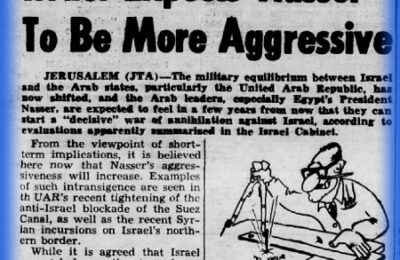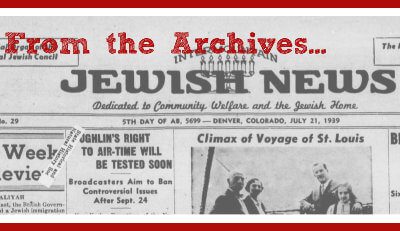Tomorrow, January 27, 2023, marks the 78th anniversary of the liberation of Auschwitz-Birkenau by Soviet forces. Today, Auschwitz is synonymous with Hitler’s war against the Jews. But how was it viewed in 1945? Was it a recognizable symbol of Hitler’s Final Solution? Did its liberation garner news headlines in the Jewish press? To find out, we took a tour of the IJN archive, and were surprised by the results.

Soviet soldiers liberating Auschwitz concentration camp. (Olga Vsevolodovna Ignatovitsj/Wikipedia)
There is not a single mention in the year 1945 of the liberation of Auschwitz. The first mention at all in the newspaper came in the July 7, 1944 edition. The context was the deportation to Auschwitz of nearly half a million Hungarian Jews between April and June, 1944. Make no mistake: Their fate was known — as was those of Jews sent to other concentration camps. “1,750,000 Jews were slain in two extermination camps in Auschwitz and Birkenau, Upper Silesia, between April 15, 1942 and April 15, 1944. These figures do not include the many thousands slain in death centers elsewhere, nor the 400,000 Hungarian Jews deported to these two camps since April 6 last.”
Later that year, after the President’s War Refugee Board confirmed the figures, Colorado Senator Ed C. Johnson “led Congressional demands for punishment of the Nazi perpetrators” (IJN, Dec. 1, 1944).
The first mention of the notorious camp’s liberation comes in an unexpected — and surprisingly celebratory — way. In the August 30, 1945 edition, in an article in how some of the Nuremberg racial laws persist in post-war Germany, on July 21, “the first Jewish marriage since 1942 was solemnized here [Berlin]. The bride and groom had met in the Auschwitz (Oswiecim) concentration camp, from which they were liberated together when the Russians overran the place.”
This news item blew us away, and reminded us immediately of this week’s lead editorial, in which we wondered at the state of mind of Jews liberated from Auschwitz, having survived long, seemingly endless years of brutality. Did they have hope for the future? Going by this news item, it seems some of them surely did. In one of the most hell-like places on earth, these two found lasting companionship.
It makes sense that Auschwitz was not yet foremost in people’s mind when thinking about the Holocaust. In fact, even the term Holocaust was barely in use (17 mentions from 1946-1950). The immediate aftermath of WW II saw a Jewish society just beginning to unravel what had befell their global community.
This online feature explores the IJN’s new digital archive, discovering the news of the week, years ago.













We remember – and should of course remember – the survivors.
But in remembering them, let’s also remember the far larger numbers of our people who did not survive.
There is a restaurant in denver called KIKES Antisemitism
Efraim, to ease your concern, the restaurant is Kiké’s, I believe the nickname for Enrique….no anti-Semitism there, just language misunderstanding.